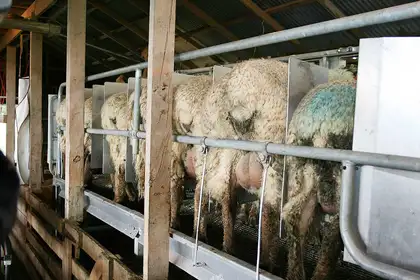
Attendees at the National Feild Days will get to test out sheep milk for themselves.
A muffin and a slice of cheesecake is great kiwi fare. But what happens when the savoury cheeses in the muffin is made from sheep milk, and dessert is a fine blend sheep milk cream cheese and blueberries? How will the consuming public react?
Those are the questions that a group of researchers and students will be looking to answer at through this year’s Massey stand at the National Field Day this week.
Part of the main pavilion stand, Massey will be offering New Zealand sheep milk products and testing the public appetite a range of foods including sheep milk muffins, risotto and desserts.
Associate Professor Craig Prichard, of the School of Management, says that people need to try sheep milk to separate what they think it will taste like and what it actually tastes like.
“Humans have been drinking sheep’s milk for thousands of years, but there seems to be a stigma around it and somehow the idea stuck that sheep milk is for animal consumption. This idea has prevailed because people haven’t experienced it for themselves. We get to know something through our senses – you need to taste it, feel the texture, smell it and experience – so that’s what we are getting people to do!”
The only way people were going to break down those barriers is it to leave your preconceptions at home and come on down and have a try.”
Associate Professor Prichard says that we are seeing new ice creams, cheeses, yoghurts and many other uses of the milk for both luxurious and staple dishes.
“Innovation with the milk is boosted by its unique flavour profile and nutritional benefit. Many won’t know, but New Zealand sheep milk is unique compared with the sheep milk of countries, and unique to the regions from where it is produced. So, you have this wonderful regional distinctiveness to products shipping to customers here and overseas.
“New Zealand research shows that compared with cow’s milk, sheep milk has unique characteristics that speed up its digestion and compared to cow’s milk, sheep milk has more energy, protein, calcium, phosphorus, potassium and magnesium. It’s also richer in vitamins A, B and E. This kind of results boost the case for sheep milk derived health supplements, and even infant formulas,” says Dr Prichard.

Sheep milk collection.
Tackling research from all sides
While small, currently just 16 producers, the sheep milk industry is currently growing by about five new producers and 3000 ewes each year. One of the two main challenges for industry is connecting consumers with extraordinary sheep milk foods and developing a high producing sheep dairy ewe best suited to our conditions.
Researchers from the University are helping to develop a New Zealand sheep dairy industry with new genetic tools, analysis of its environmental performance, developing new sheep milk storage and processing techniques and working with new entrants to the industry to produce novel products.
“Universities need to lead the way in explorative food production. We need to change the way people think and give people options they had never even thought about. It’s about taking people to the farms, to the kitchen and showing them just what can be done.”
The research group working on a number of aspects to do with sheep milk at Massey University comprises academics from many disciplines, from the College of Creative Arts to the College of Health and Business.
“Inter-disciplinary work is proving to be not only workable, but effective in developing a product from all sides – not just the marketing or the nutritional aspects but every step in the value chain that leads to the consumer plate.
“People should come along and find out the wide range of things being done in the industry,” says Associate Professor Prichard.
Visit us at the Massey University site in the main Pavilion at National Field Days, Mystery Creek, from 14 June to 17 June.